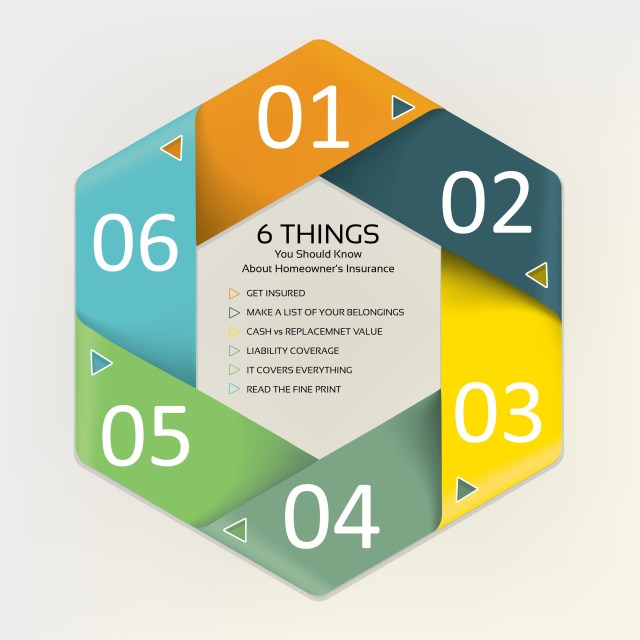6 Things You Should Know About Homeowner’s Insurance
A person feels most loved and cared in his sweet abode. But have you ever thought that your home needs care too. Future is uncertain. A home is ever vulnerable to natural and man-made disasters. In case, a misfortune strikes leading to damage or destruction of your home, it results in undue stress and a huge monetary loss. Though the emotional turmoil can only be healed with time, but at least there is homeowner’s insurance to make up for the monetary loss. Having a home insurance is invaluable. It is an irony that most of the people think of it as an unnecessary expense until they face a mishap.
Typically, a homeowner’s insurance covers your house, including both the structure and its contents, against natural disasters such as floods, hurricanes and lightning as well as man-made calamities such as fire, vandalism and theft. But contrary to the belief, there’s more to home insurance than this seemingly simple definition. Here are the 6 essential things you should know about homeowner’s insurance.
1. Get Insured – Says Who? – Your Lender.
Your house is yours, but a major fraction of the investment is made by your mortgage lender. You might deem it to be a dispensable product but mortgage lender requires you to buy a standard homeowner’s insurance as a mandate. Thus, buying a standard home insurance is a pre-condition for the borrowers to get a mortgage approval. Housing experts always recommend homeowners to go for a comprehensive insurance rather than a standard one, even if it means paying off a higher premium.
2. Make a List of Your Personal Belongings – Hurry Up!
For claiming the contents, lost or damaged, you have to prove that you own the items and you also have to prove the worth of the items. A good way is to make a list of all the valuable items you want a cover on, including electronics, jewelry and furniture. You need to keep a copy of their bills of purchase. Even better is to take photos or make a video of your key possessions. If a disaster strikes and you end up losing these possessions, having such a record smoothens the claim filing process.
3. Cash Value vs Replacement Value – Take Your Pick
There are mainly two types of homeowner’s insurance coverage. One is cash value coverage and the other one is replacement value coverage. Cash value coverage provides the insured, fair market value or current worth of the lost/damaged item reached after deduction of depreciation. This coverage wouldn’t fetch you enough money in case you want to replace the lost/damaged item with a new one. A smarter way is to opt for replacement value coverage that provides the insured, present market value of the loss/damaged item. A good example of such coverage would be guaranteed replacement value coverage in which the insurer is liable to provide you coverage to rebuild your destroyed or damaged house irrespective of the costs involved.
4. Liability Coverage – The Trump Card
You throw a party and one of your friends gets too drunk and ends up falling off a railing and hurting himself. This person is legally entitled to hold you, the owner of the house, responsible for his injury. In such cases, the liability cover included in the homeowner’s insurance provides the medical expenses to the injured party as well make up for the legal implications, if any. Here’s another example. Your dog jumps over the fence and damages the neighbor’s garden. With liability coverage, your insurer is going to pay for the costs incurred on getting the garden renovated.
5. Your Problem … is Ours to Solve
In case, your home is destroyed or damaged to an extent that it becomes inhabitable and you have to move to another house or hotel till it gets repaired; your homeowner’s insurance has got you covered. It is a lesser known feature of homeowner’s insurance. It covers the expenses incurred on paying hotel rent, meals and other incidental costs, if any. It goes without saying that this cover is subjected to daily limits and has to be utilized with due discretion.
6. Read the Fine Print, Finely
As a homeowner, you should give a thorough read to the policy’s fine print. This lets you know the exclusions to the coverage. If you happen to live in areas more prone to, say earthquakes, chances are that your insurer might exclude any damages caused by earthquakes. Thus, it is always wiser to know such exclusions beforehand.
A Word of Advice
Price is, no doubt, important but there are other factors to consider as well, while buying a homeowner’s insurance policy. You should always ascertain the credibility of the insurer. This can be done by checking its rating by credit agencies, asking for referrals, reading customer reviews, and getting to know the claim settlement ratio and the speed with which the claim is approved. Also, you should consult your lender and insurance agent just how wide a coverage you need, to be sufficiently protected from any possible contingencies while paying a premium that fits your budget.
Having comprehensive homeowner’s insurance equips you for any future contingencies. Conclusively, it can be said that not buying homeowner’s insurance for saving some bucks is more or less like stepping over a dollar to pick up a dime.
